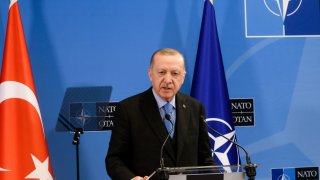Turkey and NATO: Through the Looking-Glass
Turkey is a NATO member. Why doesn’t it act like it?
Lewis Carroll’s 1871 sequel to Alice’s Adventures in Wonderland, Through the Looking-Glass, describes Alice’s adventures when she enters a fantastical world where logic is reversed. That was the same surreal experience when the U.S. ambassador to Ankara, Jeff Flake, recently claimed in an interview that the strategic partnership between Turkey and the United States was stronger than ever, stating:
A large portion of this is related to Türkiye’s response to Russia’s invasion of Ukraine and whether this response aligned with the behavior expected of a true NATO ally. This means a great deal to us, and when I talk to my former colleagues on Capitol Hill, I see that the atmosphere has changed just in the past few years.
Whether or not Ambassador Flake views Turkey through rose-tinted spectacles, the fact remains that Turkey’s response to Russia’s invasion of Ukraine, like Hungary’s, does not align with the behavior expected of a true NATO ally.
In its search for an opt-out, Hungary has sought to redefine its NATO membership. Consequently, it has agreed with NATO secretary-general Jens Stoltenberg not to block other nations’ support for Ukraine in return for non-participation. No such opt-out exists for Turkey.
It is already clear that, in practice, Turkey fails to live up to the founding principles set out in the preamble to the North Atlantic Treaty and, in fact, actively works to undermine them. A case in point is the plan, first proposed by Russian president Vladimir Putin in October 2022, for Turkey to serve as a hub for transporting Russian natural gas to Europe.
For whatever reason, Turkish president Recep Tayyip Erdogan’s planned visit to Washington in May was canceled. Still, another opportunity will arise in connection with the NATO summit in Washington from July 9–11, marking the seventy-fifth anniversary of the alliance.
Deterrence and defense are the key topics on the agenda, with Russia’s war of aggression against Ukraine posing the gravest threat to Euro-Atlantic security. In this context, Turkey’s policy of neutrality is meriting closer examination. Against a backdrop of virulent anti-Western propaganda, it will be interesting to see which grimace Erdogan adopts at the NATO summit.
In an analysis of Turkish anti-Americanism in Middle East Policy, two scholars conclude that post-Erdogan Turkey has nowhere to go economically besides the West. Despite fundraising forays to Middle Eastern neighbors, this still holds. The fact that the World Bank has increased its exposure to Turkey to $35 billion is a good example. However, despite the reinstatement of Mehmet Simsek as finance minister and a return to conventional economic policy, there is still a marked lack of foreign direct investment.
The extent to which Erdogan’s visit to Washington will lead to a significant exchange of views is uncertain, but several potential items are on the agenda. The first is Turkey’s procurement of the Russian S-400 surface-to-air defense system in 2019. This, in turn, led to sanctions through the Countering America’s Adversaries Through Sanctions Act (CAATSA) and Turkey’s removal from the United States-led F-35 consortium.
Nevertheless, in March 2022, the State Department, in a letter to Congress, considered that selling forty F-16 fighter jets and seventy-nine modernization kits to Turkey would be in line with U.S. national security interests. Because of opposition from Congress, Erdogan tightened the screws and made it clear that if Congress did not approve the deal, the Turkish parliament would not agree to Sweden’s NATO membership.
Ambassador Flake considered Congress’s approval “a great step forward.” In January, acting deputy secretary of state, Victoria Nuland, said during a visit to Turkey, “If we can get through this issue, then the CAATSA issue will go away, and we can get back into an F-35 conversation.”
However, in April, it was reported that Turkey may consider deploying its S-400 air defense system on the Iraqi border for its planned summer offensive against the Kurdistan Workers’ Party (PKK) in Iraqi Kurdistan.
Ambassador Flake assured Turkey that the U.S. military buildup in Greece’s Alexandroupoli near the Turkish border was “merely a logistical effort. We do not prefer one ally over another. Türkiye and Greece have decided that the Aegean should be a sea of peace.”
In this case, the United States should take a long, hard look at Turkey’s role in the East Mediterranean, which has the potential for explosive conflict, particularly since Hezbollah has threatened Cyprus. Cyprus, in this context, means the rump state that remained after Turkey occupied the northern third of the island fifty years ago.
Cyprus was understandably delighted when an agreement on strategic dialogue was signed in Washington, drawing Greek Cyprus into the U.S. sphere of influence as a bulwark against Turkey.
Turkey showcased its advances in defense technology during a joint military exercise EFES-2024 held in May. But it should not be forgotten that Turkey’s foreign policy, like Vladimir Putin’s, is essentially irredentist and, as such, incompatible with NATO’s aims and objectives.
Robert Ellis is a Turkey analyst and commentator. He is also an international advisor at the Research Institute for European and American Studies (RIEAS) in Athens.
Image: Gints Ivuskans / Shutterstock.com.

